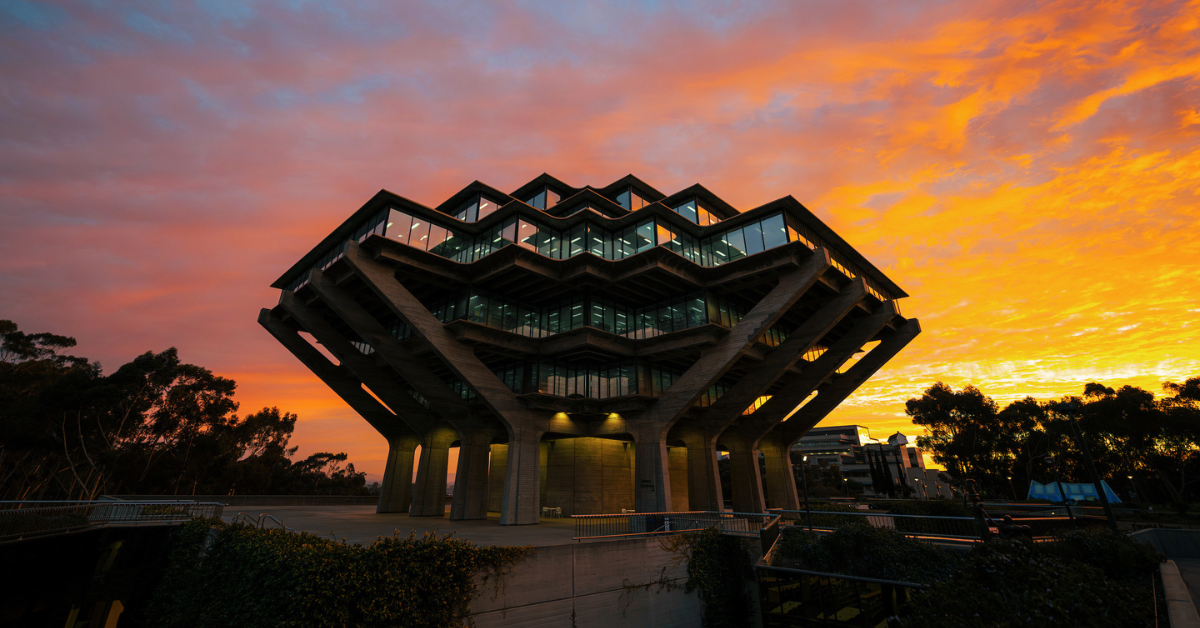A Practical Guide for Future Tritons
UCSD has 8 colleges, and choosing how to rank them in your application can be overwhelming. Which one is “best”? How do they actually differ? What should you consider when ranking them? Whether you’re an international student or local applicant, this guide will help you make an informed choice that aligns with your goals.
UCSD at a Glance
- Founded: 1960
- Location: La Jolla, California
- Setting: Coastal campus overlooking the Pacific Ocean
- Notable strengths: Sciences, Engineering, Medicine, Oceanography
- Ranking: Consistently among top public universities in the US
How Does UCSD’s College System Work?
It’s unique, but it’s not as complicated as it seems. Think of it like choosing a neighborhood in a city. Your college choice won’t lock you into (or out of) any major. You can still:
- Take classes anywhere on campus
- Use all facilities
- Join any club or organization
- Live wherever you want after freshman year
What your college actually shapes:
- The core classes you’ll take
- Where you’ll live freshman year
- Your writing courses
- Who you’ll go to for academic advice
- Your first campus community
College Profiles
1. Revelle College (Est. 1964)
Philosophy: Comprehensive liberal arts foundation, addressing “What should an educated person know?”
Features:
- Five-course interdisciplinary Humanities sequence
- Extensive science and math requirements including calculus
- Foreign language proficiency requirement
- Structured curriculum covering sciences, arts, and humanities
Best For: Students seeking a traditional liberal arts foundation—for those enjoy diving deep into both sciences and humanities. This college is great for those who want to build a strong foundation across multiple disciplines.
International students note: If your first language is not English and you completed high school in a different language, you may already meet the language requirement.
2. Muir College (Est. 1967)
Philosophy: “Celebrating the Independent Spirit,” honoring naturalist John Muir’s independent spirit through academic flexibility.
Features:
- Most flexible requirements—pick courses that interest you across sciences, math, or social sciences
- Choose two areas to explore in arts, languages, or humanities
- Two courses focused on writing and critical thinking
- Active student life and community
- Two-quarter writing program
Best For: Students who like choosing their own path. Perfect if you want to double major or explore different subjects. Great for independent learners who also want a strong community.
3. Marshall College (Est. 1970)
Philosophy: Development of the student as scholar and citizen
Features:
- “Dimensions of Culture” writing program exploring:
- 1 American experiences across race, religion, class, and gender
- 1 How Americans navigate different identities and interests
- Focus on understanding diversity and justice
- Balanced general education requirements
Best For: Students interested in understanding American society and cultural dynamics. International students should note the strong American focus of the curriculum—this could be either a learning opportunity or a challenge, depending on your interests and goals.
4. Warren College (Est. 1974)
Philosophy: “Toward a life in balance”
Features:
- Two-quarter Writing Program focused on critical analysis and argumentation
- Ethics and Society courses examining contemporary issues
- Unique academic structure requiring two areas of study outside your major
- Specialized minors in Law & Society and Health Care-Social Issues
- Strong academic internship opportunities
Best For: Students seeking a well-rounded college experience that balances academic rigor with practical skills. Great for those interested in law, public policy, or anyone who wants to combine their major with broader ethical and social understanding. Aso the college for self-starters interested in internships and real-world applications of their studies.
5. Roosevelt College (Est. 1988)
Philosophy: International understanding and global perspectives
Features:
- “Making of the Modern World” sequence studying how different societies have evolved
- Geographic specialization lets you deepen knowledge about any world region
- Additional coursework in:
– Natural sciences
– Quantitative methods
– Foreign language
– Fine arts - Home to International House and programs in Human Rights, Migration Studies, and South Asian Studies
Best For: Both international and domestic students passionate about global perspectives and international work. The strong international community makes this college especially welcoming for international students. Great for those who want to maintain their global outlook while studying in the US, or anyone aiming to work in an international environment.
6. Sixth College (Est. 2002)
Philosophy: Exploring connections between culture, art, and technology
Distinctive Features:
Three-quarter CAT (Culture, Art, and Technology) sequence
Hands-on practicum experience where you:
- Work on real-world projects
- Connect with industry partners
- Apply classroom learning practically
- Partnerships with innovation centers like Calit2’s Qualcomm Institute
- Focus on multimedia communication and tech fluency
- Combines creative and technical learning
Best For: Great for students interested in how technology shapes our world and culture, regardless of their major. Whether you’re tech-savvy or creatively inclined, this college welcomes students who want to bridge different ways of thinking. Particularly interesting for international students looking to connect with San Diego’s innovation ecosystem.
7. Seventh College (Est. 2020)
Focus: “A Changing Planet”
Distinctive Features:
- Flexible curriculum across arts, humanities, sciences, and social sciences
- Travel, research, or intern for credit
- Strong focus on real-world skills like communication and problem-solving
- Supportive, inclusive community atmosphere
Best For: Students interested in tackling contemporary challenges like climate change, mass migration, and technological shifts. Maybe you have different interests and don’t want to be boxed in. Or maybe you just like the idea of tackling real problems while you study—here, you won’t have to choose.
8. Eighth College (Est. 2023)
Focus: Building stronger communities through action
Distinctive Features:
- Newest college
- Hands-on community projects that count toward your degree
- Focus on understanding how to create positive change
- Strong emphasis on bringing diverse perspectives together
- Active, collaborative learning environment
Best For: Whether you’re planning to major in engineering or literature, if you’re interested in understanding community challenges and working on real solutions, you’ll find your people here. International students often appreciate the chance to engage with local communities in meaningful ways.
How to Apply to UCSD
- You must rank all eight colleges in order of preference when applying to UCSD
- Your major choice is separate from your college choice
- You can pursue any major at UCSD regardless of which college you’re assigned to
College Selection Process
- When applying through the UC application, you’ll be asked to rank all eight colleges from 1 (highest) to 8 (lowest)
- Your college ranking is important – think carefully about your preferences
- While you can’t change your rankings after submitting your application, you can switch colleges after enrolling (though this is not guaranteed)
Tips for Ranking Colleges
- Focus on general education requirements that match your learning style
- Consider each college’s educational philosophy
- Think about the type of community you want to join
- Don’t base your rankings on:
– Your intended major (you can study any major at any college)
– College location (you’ll take classes throughout campus)
– Perceived prestige (all colleges offer excellent education)
Final Thoughts
Here’s what we really want you to know about choosing a UCSD college: this isn’t about finding the “best” one—it’s about finding the right one for you.
You’re not just picking a set of requirements, you’re choosing a home for your college journey. Maybe you’re the kind of student who thrives with structure, or perhaps you do your best work when given freedom to explore.
The UCSD’s college system recognizes we all learn and grow differently. So as you rank your preferences, don’t stress about making the “perfect” choice. Instead, think about what kind of environment will help you thrive. After all, college is as much about how you learn as what you learn.
Remember: while your college choice shapes part of your UCSD experience, it’s what you bring to that experience that matters most. Choose with your instincts, and trust that each college has produced successful graduates in every field imaginable. Your success at UCSD will come from your dedication, curiosity, and engagement, no matter which college you call home.





